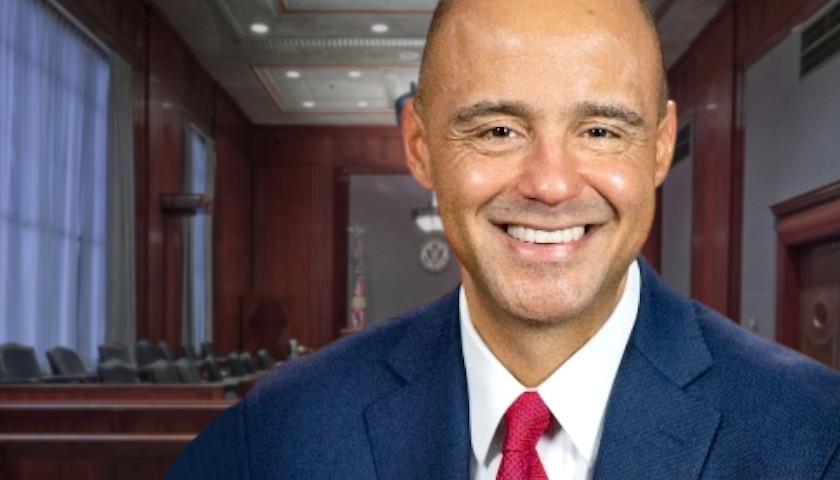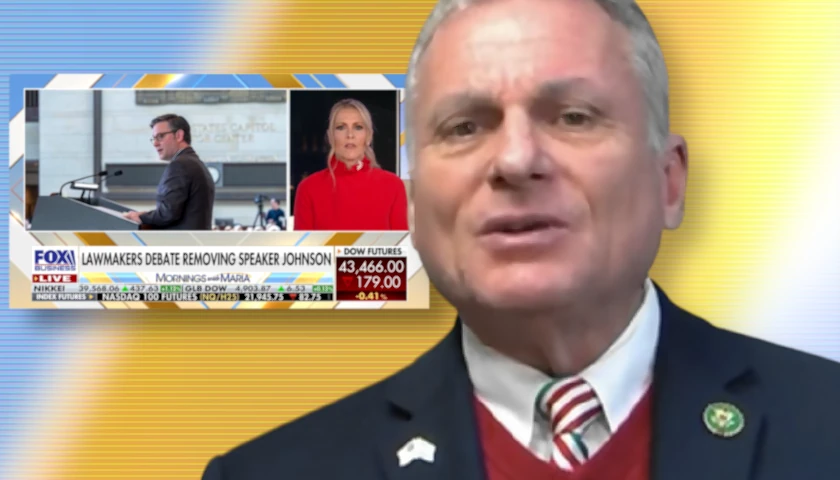Live from Music Row, Monday morning on The Tennessee Star Report with Michael Patrick Leahy – broadcast on Nashville’s Talk Radio 98.3 and 1510 WLAC weekdays from 5:00 a.m. to 8:00 a.m. – host Leahy welcomed Congressman John Rose (R-TN-06) in the studio to describe a Republican House takeover come midterm elections, leveraging 87,000 IRS agents, and his proposed Bank Privacy Reform Act.
Leahy: In the studio, Congressman John Rose, who represents the 6th Congressional District. Congressman Rose, we were talking a little bit off-air about your job, and you said something fascinating to me: that a lot of people are unhappy with X, Y, or Z, a policy or something going on.
And if it’s a federal issue, they’ll call you up and they’ll say, well, I don’t like this or that! And I want to meet with you about it!
How do you respond to that?
Rose: So we do get a lot of those calls, and I’ve got a great staff, a great team here in the district and in Washington that help me navigate that.
But when we can, we meet with those folks, and those meetings are usually interesting, and oftentimes we’ll meet with someone for maybe as much as 30 minutes to an hour.
Leahy: So they come in and they’re mad at you about your vote on something or about the world’s awful and why haven’t you fixed it or something like that. What’s that conversation usually like?
Rose: Usually, I give them the time to make their points, to make their case and listen to them, ask questions, and try to understand where they’re coming from. And remarkably, most of those folks, rarely do I end up coming to common ground with them, but most of them leave happy that they’ve been heard.
Leahy: Is that the key? They want to be heard?
Rose: I think so. I think so. I think once they’ve been heard, they usually leave with a kind of positive image of me and they feel better about the process, and that’s the way it should work.
And I learned from this because almost everyone, no matter how ill-informed they are or how much I might disagree with them from the outset, I usually pick up kernels of information or perspective that I wouldn’t have otherwise.
Leahy: Let’s talk a little bit about January 2023. Right now, we’re one week and one day away from the midterm elections. All of the polling suggests that the Republicans will take the House of Representatives.
And so fast-forward to January 2023. I’m guessing that in the event the Republicans take over the House that Kevin McCarthy will be elected Speaker.
Rose: I think so.
Leahy: And then you’re currently on the Financial Services committee. You might add another committee or two.
Rose: I hope so.
Leahy: How’s it going to be different with Republican leadership in the House of Representatives?
Rose: Sure. I think it’s important to note the real action will start very quickly when we return to Washington after Election Day. We’ll know at that time, in all likelihood, hopefully, assuming the elections go well, we’ll know if we’re going to be in the majority. And so that process of electing leadership on the Republican side for the new majority will start to happen in our caucus in November.
And so by the time we get to January 3rd, when we’re sworn in and the new Republican majority will be prepared to take over the House – and I think we’ll move a lot more quickly than the Democrats were able to move in 2019.
It took them two or three months to really stand up the House and get underway. Obviously we’re thinking about the election, but we’ve been planning strategy and planning for what our agenda will be and what policies we’ll want to advance.
And so I think fairly quickly we’ll see committee appointments from the new Speaker McCarthy and I think we’ll get underway very quickly. And again, we’ll be able to take those game plans that we’ve been working on for the last year to 18 months and implement them fairly quickly.
And one of the big steps that we’ll be able to take right away is to start doing the oversight of the Biden administration, which has been woefully lacking for the last two years. We talked about this earlier.
The contrast between what President Trump was achieving and then what we’ve seen happen in these last two years that have led us to this high inflation and a crisis at our southern border, a reduced standing in the world, and the burgeoning crime crisis that we have in this country; all of those things are the direct result of bad policies.
And so we won’t be able to turn all of that around because the president will still be the president, it appears. And he’ll have a veto pen even if we’re able to win the majority in the House and the Senate, which I think we will also win.
We will still face the filibuster in the Senate and we’ll still face the oresident’s veto pen so it will slow us down a little in terms of turning the country around.
Leahy: About those 87,000 new IRS agents, (Chuckles) are we going to be able to get rid of that?
Rose: I hope we will. I think there is where we’ll be able to focus on some leverage. So obviously, the president is still going to want to accomplish things and so we’re still going to have to fund the government and the Congress will have that leverage to use.
We’re going to come up on the debt ceiling pretty quickly. That will be the first, I think, flashpoint in dealing with the administration. And I think we’ll use that to turn back some of the most egregious policies.
An army of IRS agents chasing Middle America is not anyone’s idea, or ideal, for this country and is a great over-extension of the power of the IRS.
Leahy: Would that come in the form of a bill, or how would that turn into reality to get rid of those 87,000 agents? Would it come out of appropriations?
Rose: Yes, I think that’s where it’s most likely to be implemented. I expect there will be a raft of new bills on that to introduce fairly early in the new Congress.
In the 117th Congress, I think you’ll see a number of members introduce bills. But where I think that’s most likely to come into implementation will be in the appropriations process.
Leahy: Do you have a particular bill that you would be interested in proposing?
Rose: I actually just introduced here, a few weeks ago, a couple of weeks back, what I call the Bank Privacy Reform Act, and it is one of the bills that I’ll be pushing forward. Probably most Americans don’t realize that today, most of their private banking information in one way or another gets reported to the federal government.
The government doesn’t have to go through the normal process of getting a warrant to get that information. And so my bill would reverse that. And the vast majority, 87 percent of Americans, agree with the proposal that I’m making.
Leahy: That is not encouraging to know that that exists. I hope that bill passes.
Rose: Well, hopefully so. And I think in the new Congress, it will have a chance.
Listen to today’s show highlights, including this interview:
– – –
Tune in weekdays from 5:00 – 8:00 a.m. to The Tennessee Star Report with Michael Patrick Leahy on Talk Radio 98.3 FM WLAC 1510. Listen online at iHeart Radio.
Photo “John Rose” by Congressman John Rose. Background Photo “IRS Building” by Cliff. CC BY 2.0.





